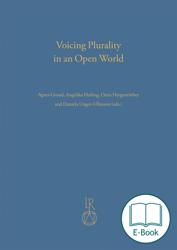In a world characterized by mobility and dynamic formations of cultural, linguistic, and social identities, the general understanding of languages – at least in Europe – still reflects hierarchies and classifications that are based on the 19th century-based nation-state ideology. This book deals with relevant aspects of language against the contemporary ideal of open, pluralistic societies, as well as with consequences on language of increasingly complex and diverse power relations, migration, globalization, and modern phenomena such as ICT.
Although linguistic plurality and power relations between languages (and their speakers) are changing constantly and at high speed as a result of global migration and democratization processes, the general understanding of languages – at least in Europe – still reflects hierarchies and classifications that are based on the 19th century-based nation-state ideology. However, status differences between languages and the associated power structures cannot be described using 19th century concepts and terminology. Such an understanding would negate all socio-political and socio-cultural developments of the last decades. In recent decades, globalization, increased mobility, transnational networking, and innovative communication technologies have created new forms of language use, more complex and diverse power relations and generally diverse perspectives regarding language. This book deals with relevant aspects regarding the status dimensions of language against the background of the ideal of an open, pluralistic society. These are the key points:
- Changes in the linguistic landscape in the course of/as a result of migration and globalization
- Role and status of languages in pluralistic societies
- The relationship between native languages, diaspora languages, migrant languages, and majority languages
- Languages and the relevance of ICT
- Power relations between languages and their speakers
The volume Voicing Plurality in an Open World brings together scholars from the fields of linguistics and related disciplines with interest and expertise in linguistic issues and globalization issues, focusing on the status and power relations between languages and their speakers, and their influence and/or transformative potential in a world characterized by mobility, increased complexity, and diverse dynamic formations of cultural, linguistic, and social identities. The authors included here collaborated with Prof. Dieter Halwach in a variety of ways throughout his academic career. The book reflects the interests and focus of his work, as well as his efforts in developing the Plurilingualism Research Unit at the treffpunkt sprachen Centre of the University of Graz.
Agnes Grond (1972), Mag. Dr. phil. University Assistant at the Institute for Translation Studies, Research Unit for Translation–Migration–Minorities, University of Graz. Her research on Kurdish diaspora languages in Austria draws on the concepts of critical sociolinguistics with a particular focus on new methodological approaches and the development of a practical framework for a broader understanding of the relationship between environmental influences, language policies, and language ideologies on language use in multilingual communication.
Angelika Heiling (1983), Mag.phil. She pursued her MA in English, American Studies and Gender Studies at the University of Graz and the University of Aberdeen. She is currently employed at the Plurilingualism Research Unit and writing a doctoral thesis on local and translocal voices in literature and films from southern Africa. Her main research interests are in critical sociolinguistics and literature, with a focus on Southern African multilingualism, urban multilingualism, and migrant and diaspora contexts.
Oana Hergenröther (1987), Dr. MA. She is post-doctoral researcher in literature at the Plurilingualism Research Unit and the Institute of Slavic Studies of the University of Graz. She studied English and American Studies at the University of Novi Sad, Serbia, and write her doctoral thesis on the novels and films of contemporary American author Paul Auster, basing her later monograph on her doctoral research. She has worked at the University of Graz since 2015, exploring her main interests: literatures in plurilingual and minority contexts with a focus on Southeastern Europe; Age/ing Studies, and contemporary American literature and culture. She is also an active literary translator between Serbian, Romanian, English, and Spanish.
Daniela Unger-Ullmann (1971), Mag. Dr. phil. Since 2007, Head of treffpunkt sprachen – Center for Language, Plurilingualism and Didactics at the University of Graz – and responsible for the university’s anchoring and securing as well as strategically developing the ongoing teaching and research. She studied German and Latin to become a teacher at the University of Graz and completed further academic training in German as a Foreign Language, and Media Studies. She completed her doctorate at the Institute for German Studies in Graz with a dissertation in Older German Literature. From 2010 to 2015 she was director of the Confucius Institute at the University in Graz. Her research focuses on education and teaching management, human resources and organizational development, and language teaching and learning research.


 Table of Contents
Table of Contents